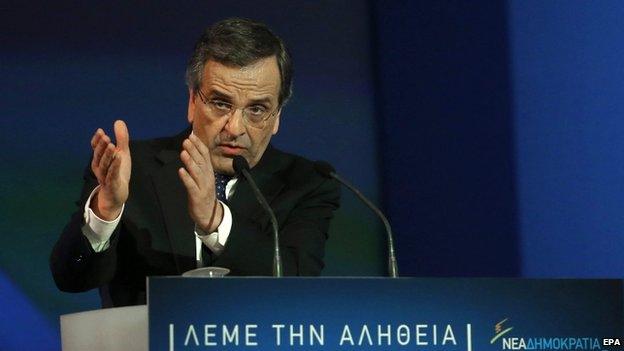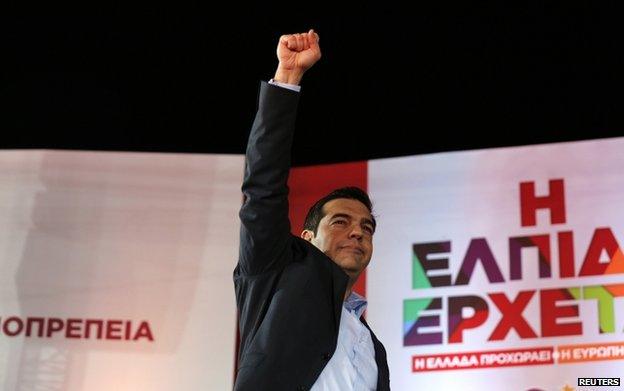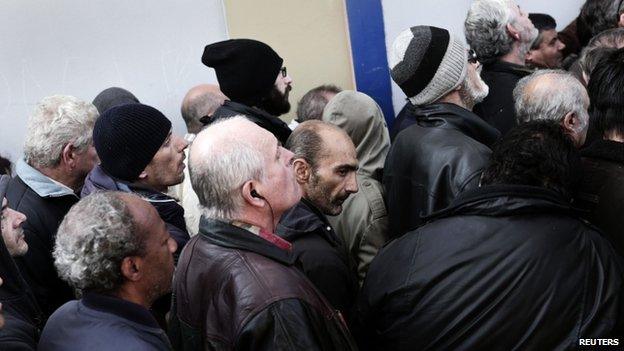Greek elections: Europe waits on voters' verdict
- Published
- comments
Supporters of the radical left-wing party Syriza have been taking to the streets of Athens
When Greeks vote on Sunday they will not just be choosing a new government, they will be delivering a verdict on Europe and its leaders.
If the polls are accurate, Greece is on the verge of electing the first anti-austerity party in the eurozone. If that happens, Greece's future will once again be uncertain.
But the election will be judgement day on how Europe has managed its financial and economic crisis. The country has been bailed out with €240bn (£188bn) from the EU, the ECB and the IMF. But the economy has shrunk by 25%, unprecedented in the modern era.
Many Greeks believe they have been assigned to a laboratory for austerity.
Prime Minister Antonis Samaras, when in opposition, was mistrusted by Brussels and Berlin. He doubted whether cutting spending in the middle of a recession would work and resisted signing up to it. In power, he has essentially followed the script of the so-called troika; the EU, the IMF and the ECB.

Prime Minister Antonis Samaras has headed a fragile coalition government
In exchange for being bailed out, Greece has had to accept a tough programme of public sector spending cuts and tax increases. There are some green shoots. The country has a budget surplus and is no longer in recession. Receipts from tourism are up and Greece has an impressive number of start-up technology companies.
'National humiliation'
Mr Samaras's pitch to the Greek people is "stay the course". He promises to take Greece out of the bailout programme albeit with an extended line of credit. He is very much the candidate backed by Brussels and Berlin.
His challenger is Alexis Tsipras from the radical left party Syriza. He is young, dynamic and promises an end to what he calls national humiliation. He believes austerity has been a disaster not just for Greece but for Europe. He promises to renegotiate the bailout agreements and to restructure the debt which is currently 175% of GDP.

Alexis Tsipras has asked supporters for a clear mandate to enable him to end the country's austerity policies
From day one of taking office, he will move to raise the minimum wage, restore electricity to those who have been cut off and provide health care for the uninsured. It is an ambitious programme. His critics doubt he can deliver it.
Society has suffered
Unemployment, after five years, is at 26% (nearly 50% for the young). The middle class feels battered with many worn down by the years of cuts. They seem ready to gamble on Syriza despite the warnings that Mr Tsipras will lead the country into a confrontation with its creditors.
Just beneath the surface it is easy to see how much Greek society has suffered; drop-in centres where thousands are fed; makeshift pharmacies where those without health-cover can find prescription drugs which have been donated; the young woman who says she that she owes money to all her friends; a tailor who repairs thread-worn jeans time and time again for just 4 euros (£3); the 200,000 who have left Greece during the crisis.

People queue for a Christmas meal at a drop-in centre for the homeless and poor in Athens
Hopelessness may decide this election. There is, however, little appetite to leave the euro or to leave the EU. Most Greeks want to stay in the European club. They fear being on the outside.
There is a tendency to overlook the corruption, the jobs handed out by politicians, the over-generous welfare payments and the tax evasion. Greece should never have joined the euro on the back of unreliable statistics. But they firmly want to stay part of the European Union.
Unravelling
If Syriza wins on Sunday - and if it wins an overall majority - it will once again unsettle Europe. It will not carry the risks of 2012 when the markets feared a Greek default with contagion spreading to Spain and Italy. The ECB has removed that threat. But Brussels will fear instability.
Alexis Tsipras has said he will negotiate - but what happens if there is deadlock? Already one European prime minister has said he will resist any move to forgive Greek debt. Others are not prepared to renegotiate the bailout deals and soften the terms. The Germans have even hinted they could allow Greece to leave the eurozone. I am sceptical of that.
But negotiations will be difficult. And Greece has some big payments to make later in the year. A wrong move could pitch the country into default.
And if Europe's leaders were to agree to bold concessions then other countries might seek an easing of their budget limits too. Germany would fear that the financial discipline it has sought to introduce into the eurozone was unravelling.
The Greek electorate might still chose to stick with the status quo. Mr Samaras has warned against the left-wing Syriza by saying: "We are not going to turn into the Soviet Union here - communism won't win." Ultimately some may shy away from voting for the radical left, but the polls suggest austerity has left many people weary and resentful.
Sunday's election could be a significant day for Europe when in troubled times an anti-establishment party takes power. And victory here could boost other far-left parties like Podemos in Spain. Both Greece and Europe will be watching.